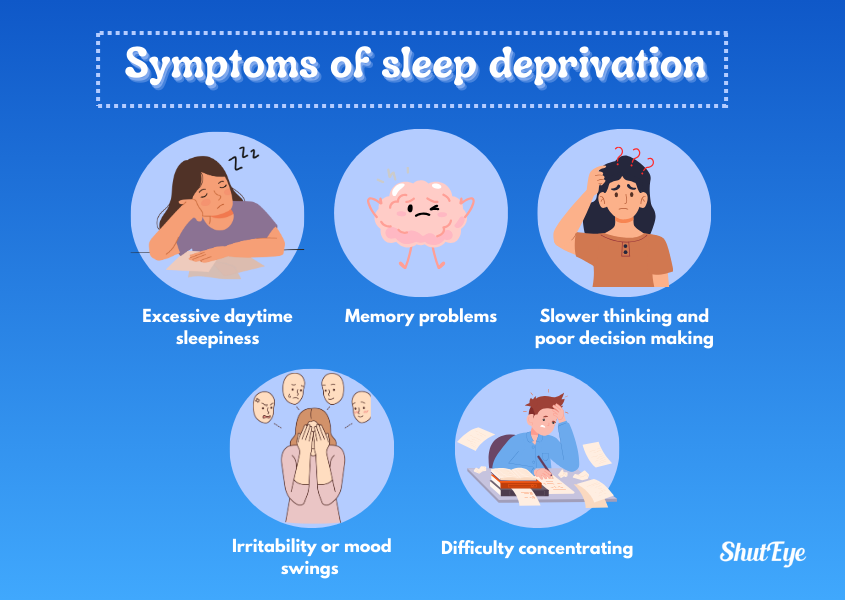


According to studies, one in five adults experience sleep deprivation. This is a cause of concern especially when it can significantly impact your health and well-being and lead to chronic illnesses.
In this article, we’ll explore the causes and consequences of sleep deprivation, as well as provide strategies to combat it. By prioritizing sleep, establishing good sleep habits, and seeking medical assistance if needed, you can improve your sleep quality and overall daily life.
Sleep deprivation is a condition that happens when you do not get enough sleep.
Most adults require 7 to 8 hours of sleep each night for optimal health. When you do not get enough sleep, you then become sleep-deprived. This may be a short-term issue that lasts for 24 hours to a few nights. In some cases, it may be a chronic condition that lasts few weeks or months. Long-term sleep deprivation may cause a series of chronic health problems.
One of the most common causes of sleep deprivation is having a busy lifestyle which prevents you from getting enough sleep. However, several factors contribute to sleep deprivation which are:
By understanding these causes of sleep deprivation, helps you to identify whether your sleep may potentially be affected by any of them. Thus, allowing you to take appropriate steps for treatment.
Aside from knowing the causes, you will also need to know the symptoms for a much proper diagnosis. Sleep deprivation isn’t simply feeling tired and sleepy. In fact, the symptoms goes beyond that. Here are some common symptoms an individual can experience:

You may also like:
can you die from lack of sleep
If you ever think of challenging yourself to see how long you can go without sleep, you may want to think twice. The effects of sleep deprivation can have a significant impact on your overall well-being and daily functioning. Lack of sleep can lead to a range of health problems and impair your cognitive abilities. Here are some of the effects of sleep deprivation:
Sleep deprivation can also increase the risk of developing chronic health problems such as obesity, diabetes, cardiovascular disease, and mental health disorders. It can affect your performance at work or school, as well as your personal relationships. If you are experiencing the effects of sleep deprivation, it is important to seek help from a sleep specialist who can provide guidance and support in combating this issue.
Taking steps to improve your sleep hygiene and establish healthy sleep habits can help alleviate the negative effects of sleep deprivation and improve your overall well-being. You can try tracking your sleep with ShutEye®, to see how you can improve your sleep score.

To accurately diagnose sleep deprivation, healthcare professionals often assess sleep duration and symptoms reported by individuals. Some of the ways to diagnose sleep deprivation include:
Healthcare professionals need to rule out underlying sleep disorders or medical conditions that may contribute to sleep deprivation. By gathering information about an individual’s sleep habits and conducting appropriate tests, healthcare professionals can make an accurate diagnosis of sleep deprivation and determine the best course of treatment.

To address sleep deprivation, healthcare professionals offer various treatment options to improve sleep quality and address underlying sleep disorders. The goal is to help you get enough sleep and ensure that you’re getting the recommended hours of sleep each night for optimal health.
Here are some treatment options that may be recommended:
1. Sleep Hygiene: This involves adopting healthy sleep habits and practices, such as establishing a consistent sleep schedule, creating a relaxing bedtime routine, and creating a sleep-friendly environment.
2. Cognitive Behavioral Therapy for Insomnia (CBT-I): This is a type of therapy that focuses on changing negative thoughts and behaviors that contribute to sleep problems. It can help improve sleep quality and reduce the time it takes to fall asleep.
3. Medications: In some cases, healthcare professionals may prescribe medications to help with sleep. These may include sleep aids, such as sedatives or hypnotics, but they’re typically used for short-term relief and should be used under medical supervision.
To prevent sleep deprivation, establish a consistent sleep schedule that allows for 7 to 8 hours of sleep each night. This will help regulate your body’s internal clock and ensure that you get enough restorative sleep.
Additionally, consider the following strategies to combat sleep deprivation:
Now that you understand what sleep deprivation is and how it can affect you negatively, reflect on your past sleep habits and consider whether you have been depriving yourself of much-needed rest.
Remember that getting enough sleep is one of the most important factors in cultivating good well-being!
Institute of Medicine (US) Committee on Sleep Medicine and Research; Colten HR, Altevogt BM, editors. Sleep Disorders and Sleep Deprivation: An Unmet Public Health Problem. Washington (DC): National Academies Press (US); 2006. 3, Extent and Health Consequences of Chronic Sleep Loss and Sleep Disorders. Available from: https://ncbi.nlm.nih.gov/books/NBK19961/